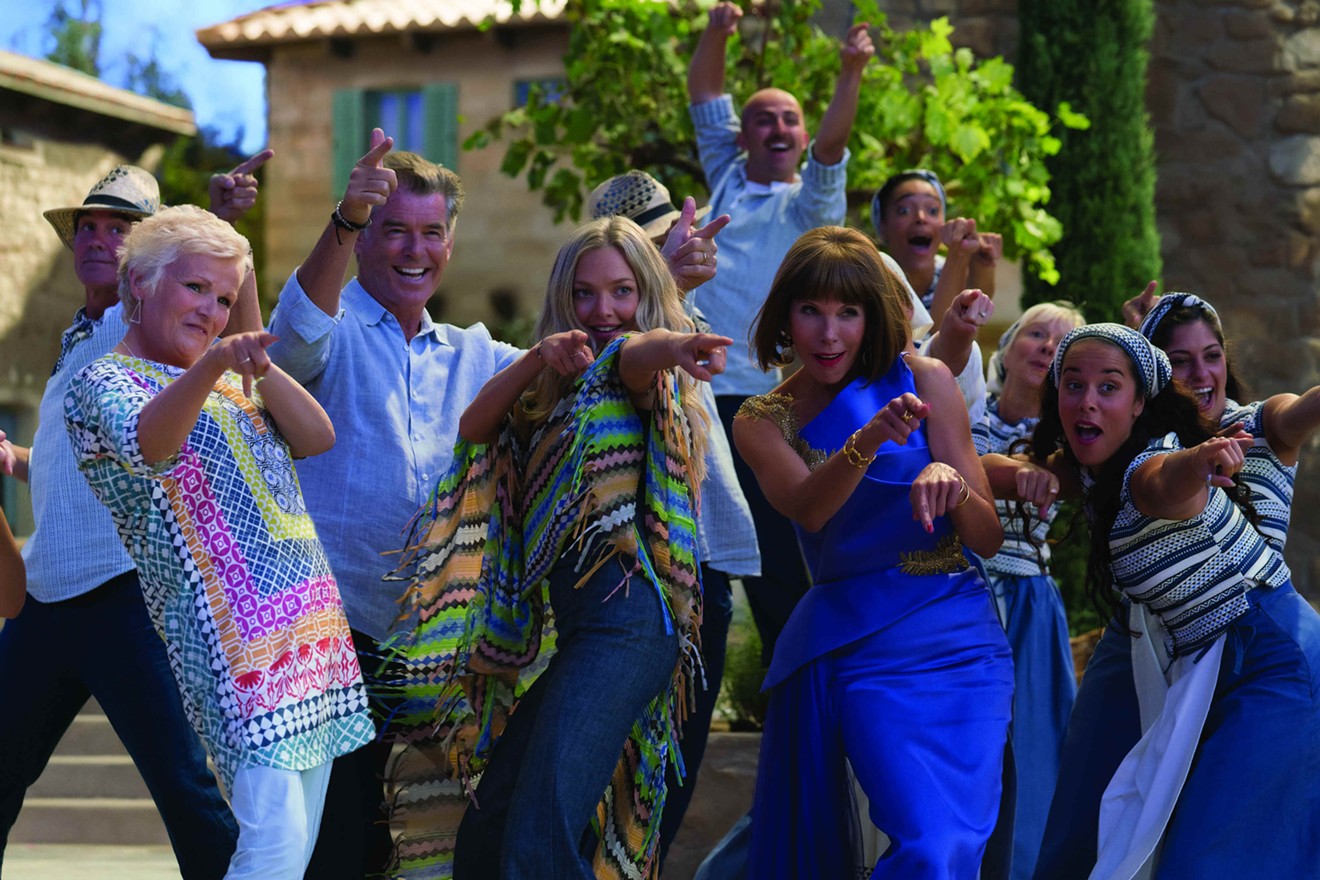The psychological term for a real smile, a true one, is the “Duchenne smile,” named for the neurologist who discovered that a forced grin could freak people out just as much as a genuine one could infect others with joy. Actors are practiced at pretending to be merry on the screen, but for a skeptic like me, there are precious few that can effectively turn on my Duchenne sensors. I have never once believed, for instance, that a Dustin Hoffman character has smiled from actual happiness. My favorite movie smiles are the ones that arrive like a surprise on the actor’s face, like Jada Pinkett Smith’s wide-eyed beam as she watches Channing Tatum dance and grind in Magic Mike XXL. It’s a blurring of actor and character, where real-life glee becomes so apparent that it overtakes the fiction.
When I catch that kind of startled smile, my face instinctively spreads into its own. I mirror what I see. And while watching Ol Parker’s Mamma Mia! Here We Go Again, I found myself grinning so hard and for so long that by the end, the muscles in my face were sore. The film’s half-baked story about a girl trying to live out her slutty, wonderful, deceased mother’s dream of operating a hotel on a Greek island (all set to the music of ABBA) is so thoroughly entertaining and ridiculous that the cast can’t help but crack into dumb grins at what they’re doing. That especially goes for the guys — Pierce Brosnan, Stellan Skarsgard and Colin Firth — who reprise their roles from the first film as Sam, Bill and Harry, respectively. Even the title of this sequel, Here We Go Again, suggests a giddy exasperation and disbelief that these A-list actors have gathered in the Mediterranean, essentially to perform ABBA karaoke. And, my God, is it wonderful.
It’s been ten years since the first installment of the Mamma Mia! franchise — it’s a franchise, right? In the time that’s passed in the story, Donna (Meryl Streep) has died, and her daughter, Sophie (Amanda Seyfried), is about to host a grand-opening party for the newly remodeled hotel Donna once ran. This gives an excuse for everyone from the last film to return to the island, including the three men who could each be Sophie’s father, and Donna’s comic-relief best buds, Tanya (Christine Baranski) and Rosie (Julie Walters). As Sophie faces a series of tribulations — an absent boyfriend, a grieving heart, a dastardly storm — we see the backstory of how a young Donna (Lily James) ended up on this island, pregnant with Sophie, in the first place.
James is a delightful addition. She’s jocular, with a soft touch, and seems to understand that in a movie like this, even scenes of mourning or pain should be painted with a light watercolor brush; she exudes a distinct Julia Roberts vibe. Young Donna shares a dance number with Young Harry (Hugh Skinner), and their goofy rapport carries the day. Relish the throwaway moment where a French maître d’ (in a restaurant called Waterloo) removes the silver lids from two plates, revealing the actors’ heads: Donna turns to peek at Harry, and she throws her head back and laughs, as though she’s genuinely shocked to find him there. I felt like I was watching an episode of The Monkees, and I mean this as a sincere compliment.
The rest of the young back-in-the-day cast does not disappoint, either. The best newcomers are Young Tanya (Jessica Keenan Wynn) and Young Rosie (Alexa Davies), whose mannerisms and speech studiously mimic those of their “adult” counterparts. Young Tanya turns to a man and says, “I’ll be honest, I enjoy you visually,” with more than a little Baranski tartness in her tone. And, of course, Baranski herself is a gem of a comic actress. At one point, her Tanya gets introduced to an older handsome man, and her first sleazy words are a cheerful “I hope his wife is dead.”
But back to that ABBA music, which again proves fitting for a garish musical sung almost exclusively by beautiful, casually wealthy white people dancing among ethnically ambiguous extras. ABBA is not meant to have edges; it’s pop disco with hauntingly smooth harmonies. Grace Jones once said that clubs are like church and disco music is the hymnal. If that’s true, ABBA is clearly Unitarian. It’s not that the music is soulless, but rather that it is calculatingly universal in its themes of love and nostalgia. I am helpless in its sway. That is why Cher’s appearance in this film and her rendition of a curiously absent favorite from the first Mamma Mia! had me applauding in anticipation the second I figured out what was coming.
Every single person in the cast seems geeked to be in this. I’m not even sure Firth and Skarsgard are receiving direction in one scene where they re-enact that romantic embrace at the bow of the ship in Titanic, with Skarsgard hugging Firth from behind. They simply seem happy to be there, and I am happy to watch them being happy. The movies can do this: They can share happiness.
[
{
"name": "Air - MediumRectangle - Inline Content - Mobile Display Size",
"component": "12017618",
"insertPoint": "2",
"requiredCountToDisplay": "2"
},{
"name": "Editor Picks",
"component": "17242653",
"insertPoint": "4",
"requiredCountToDisplay": "1"
},{
"name": "Inline Links",
"component": "18838239",
"insertPoint": "8th",
"startingPoint": 8,
"requiredCountToDisplay": "7",
"maxInsertions": 25
},{
"name": "Air - MediumRectangle - Combo - Inline Content",
"component": "17261320",
"insertPoint": "8th",
"startingPoint": 8,
"requiredCountToDisplay": "7",
"maxInsertions": 25
},{
"name": "Inline Links",
"component": "18838239",
"insertPoint": "8th",
"startingPoint": 12,
"requiredCountToDisplay": "11",
"maxInsertions": 25
},{
"name": "Air - Leaderboard Tower - Combo - Inline Content",
"component": "17261321",
"insertPoint": "8th",
"startingPoint": 12,
"requiredCountToDisplay": "11",
"maxInsertions": 25
}
]











